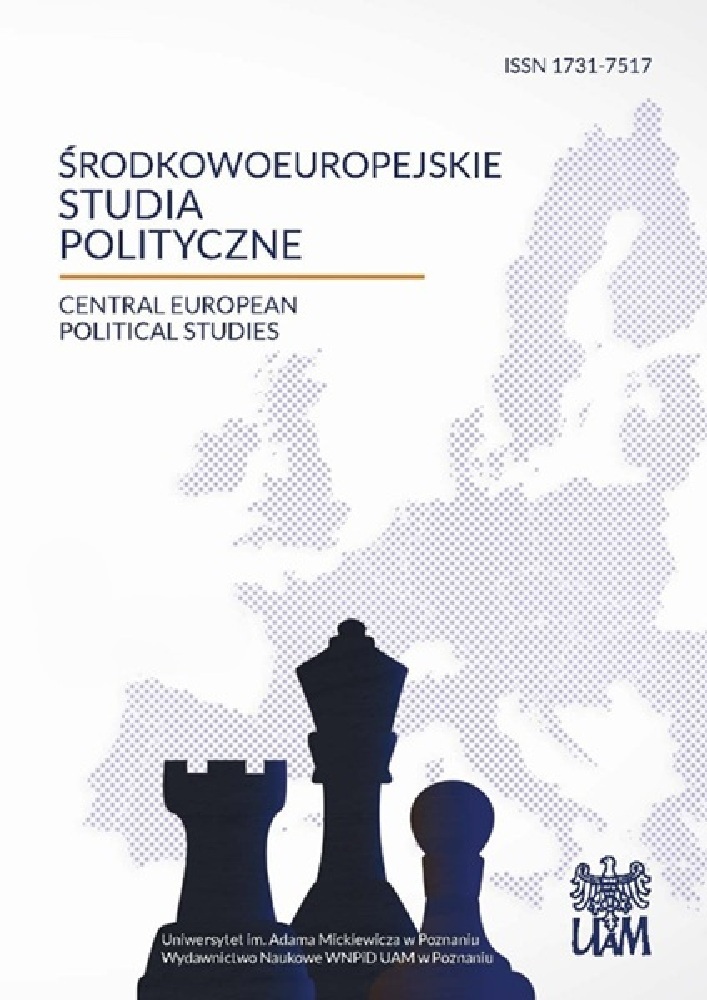Abstrakt
Niniejszy artykuł dotyczy rozdźwięku pomiędzy liberalną retoryką a społeczno- polityczną rzeczywistością współczesnych stosunków międzynarodowych. Autor twierdzi, że jakkolwiek liberalizm nadal zapewnia wiodącą perspektywę eksplanacyjną współczesne stosunki międzynarodowe są zbyt dynamiczne i skomplikowane aby można było zanalizować je wyłącznie w ramach liberalizmu, który zresztą popada w dogmatyzm. Z tego powodu, adekwatna analiza współczesnej demokracji oraz politycznych i gospodarczych aspektów współczesnych stosunków międzynarodowych jest niepełna, jeśli nie uwzględnia pewnych wniosków ze sfery realizmu, konstruktywizmu, a nawet postmodernizmu. Przykład transformacji demokratycznej w Europie Środkowo-Wschodniej doskonale obrazuje tę tezę. Liberalne reformy w regionie wciąż zderzają się z rygorystycznymi poglądami wywodzącymi się z socjalistycznej przeszłości. Liberalne wartości sąpoza tym zniekształcane i błędnie pojmowane. Wyjaśnianie tych procesów wykracza daleko poza liberalizm i analiza nawet samego wschodniego poszerzenia Unii Europejskiej byłaby bardziej wyczerpująca gdyby uwzględniła pewne odniesienia do realizmu, krytyki teoretycznej czy postmodernizmu.
Bibliografia
Brier R. (2010), Fashioning apost-communistpolitical identity. The case of Poland’s Democratic Left Alliance, in: The Post-Communist Condition. Public andprivate discourses of transformation, eds. A. Galasińska, D. Galasiński, John Benjamins Publishing Company, Amsterdam and Philadelphia.
Burchill S. (2005), Liberalism, in: Theories o f International Relations (third edition), eds. S. Burchill, A. Linklater, R. Devetak et al., Palgrave Macmillan, Houndmills- Basingstoke-Hampshire- New York.
Cienski J. (2010), EUfunds turn Poland into €10bn building site, “Financial Times”, 29 November 2010.
Cox T. (2003), Changing Societies: Class and Inequality in Central and Eastern Europe, in: Developments in Central andEast European Politics 3, eds. S. White, J. Batt, P. G. Lewis, Palgrave Macmillan, Houndmills-Basingstoke-Hampshire-New York.
Devetak R. (2005), Postmodernism, in: Theories o f International Relations (third edition), eds. S. Burchill, A. Linklater, R. Devetak et al., Palgrave Macmillan, Houndmills-Basingstoke-Hampshire-New York.
Donnelly J. (2000), Realism and International Relations, Cambridge University Press, Cambridge.
Erlanger S. (2011), Euro, Meant to Unite Europe, Seems to Rend It, “The New York Times”, 19 October 2011.
Fukuyama F. (1989), The End o f History?, “The National Interests”, Summer 1989, http://ps321.community.uaf.edu/files/2012/10/Fukuyama-End-of-history-article.pdf, 03.12.2014.
Galasińska A., Galasiński D. (2010), Living between history and the present. The Polish postcommunist condition, in: The Post-Communist Condition. Public and private discourses o f transformation, eds. A. Galasińska, D. Galasiński, John Benjamins Publishing Company, Amsterdam and Philadelphia.
Higgins A. (2014), Populists’ Rise in Europe Vote Shakes Leaders, “The New York Times”, 26 May 2014.
Jablonski A. W. (2000), The Europeanisation o f government in Poland in the 1990s, in: Poland and the European Union, ed. K. Cordell, Routledge, London-New York.
Jackson J. E., Klich J., Poznańska K. (2005), The Political Economy o f Poland’s Transition. New Firms and Reform Governments, Cambridge University Press, New York.
Morgenthau H. J. (1948), Politics Among Nations. The Struggle fo r Power and Peace, First Edition, Alfred A. Knopf, New York.
Morgenthau H. J. (1947), Scientific Man vs. Power Politics, Latimer House Limited, London.
Morgenthau H. J. (1960), The Purpose ofAmerican Politics, Alfred A. Knopf, New York.
Mungiu-Pippidi A. (2010), When Europeanization Meets Transformation: Lessons from the Unfinished Eastern European Revolutions, in: Democracy and Authoritarianism in the Postcommunist World, eds. V. Bunce, M. McFaul, K. Stoner-Weiss, Cambridge University Press, New York.
O’Donnell G. (1996), Illusions About Consolidation, “Journal of Democracy”, vol. 7, no. 2.
Oliker O., Crane K. et al. (2009), Russian Foreign Policy. Sources and Implications, RAND Corporation, Santa Monica.
Ost D. (1993), The Politics o f Interest in Post-Communist East Europe, “Theory and Society”, vol. 22, no. 4.
Rose-Ackerman S. (2005), From Elections to Democracy. Building Accountable Government in Hungary and Poland, Cambridge University Press, New York.
Rupert M. (2010), Marxism and Critical Theory, in: International Relations Theories. Discipline and Diversity, eds. T. Dunne, M. Kurki, S. Smith, Oxford University Press, Oxford.
Rupnik J. (2007), Is East-Central Europe Backsliding? From Democracy Fatigue to Populist Backlash, “Journal of Democracy”, vol. 18, no. 4.
Russett B. (2010), Liberalism, in: International Relations Theories. Discipline and Diversity, eds. T. Dunne, M. Kurki, S. Smith, Oxford University Press, Oxford.
Smilov D., Krastev I. (2008), The Rise ofPopulism in Eastern Europe: Policy Paper, in: Populist Politics and Liberal Democracy in Central and Eastern Europe, G. Meseznikov, O. Gyarfasova, D. Smilov, Institute for Public Affairs, Bratislava.
Smith T. W. (1999), History and International Relations, Routledge, London-New York.
Stachura P. D. (1999), Poland in the Twentieth Century, Macmillan Press Ltd. Houndmills-Basingstoke-Hampshire-London.
Stiglitz J. E. (2004), Globalizacja, PWN, Warszawa.
Vachudova M. A. (2010), Democratization in Postcommunist Europe: Illiberal Regimes and the Leverage o f the European Union, in: Democracy and Authoritarianism in the Postcommunist World, eds. V. Bunce, M. McFaul, K. Stoner-Weiss, Cambridge University Press, New York.
Vanhuysse P. (2006), Divide and Pacify Strategic Social Policies and Political Protests in Post-Communist Democracies, Central European University Press, Budapest.
Wallerstein I. (1996), The inter-state structure o f the modern world-system, in: International theory:positivism andbeyond, eds. S. Smith, K. Booth, M. Zalewski, Cambridge University Press, New York.
Waterfield B., Freeman C. (2014), EU leaders divided over new sanctions to punish Russia fo r annexing Crimea, “The Telegraph”, 20 March 2014.
Williams M. C. (2005), The Realist Tradition and the Limits o f International Relations, Cambridge University Press, Cambridge.
Winiecki J. (1997), Introduction: Seven Years’Experience, in: InstitutionalBarriers to Poland s Economic Development. The incomplete transition, ed. J. Winiecki, Routledge, London-New York.
Licencja
Copyright
© 2015, Uniwersytet im. Adama Mickiewicza w Poznaniu, Wydawnictwo Naukowe Instytutu Nauk Politycznych i Dziennikarstwa
OPEN ACCESS
